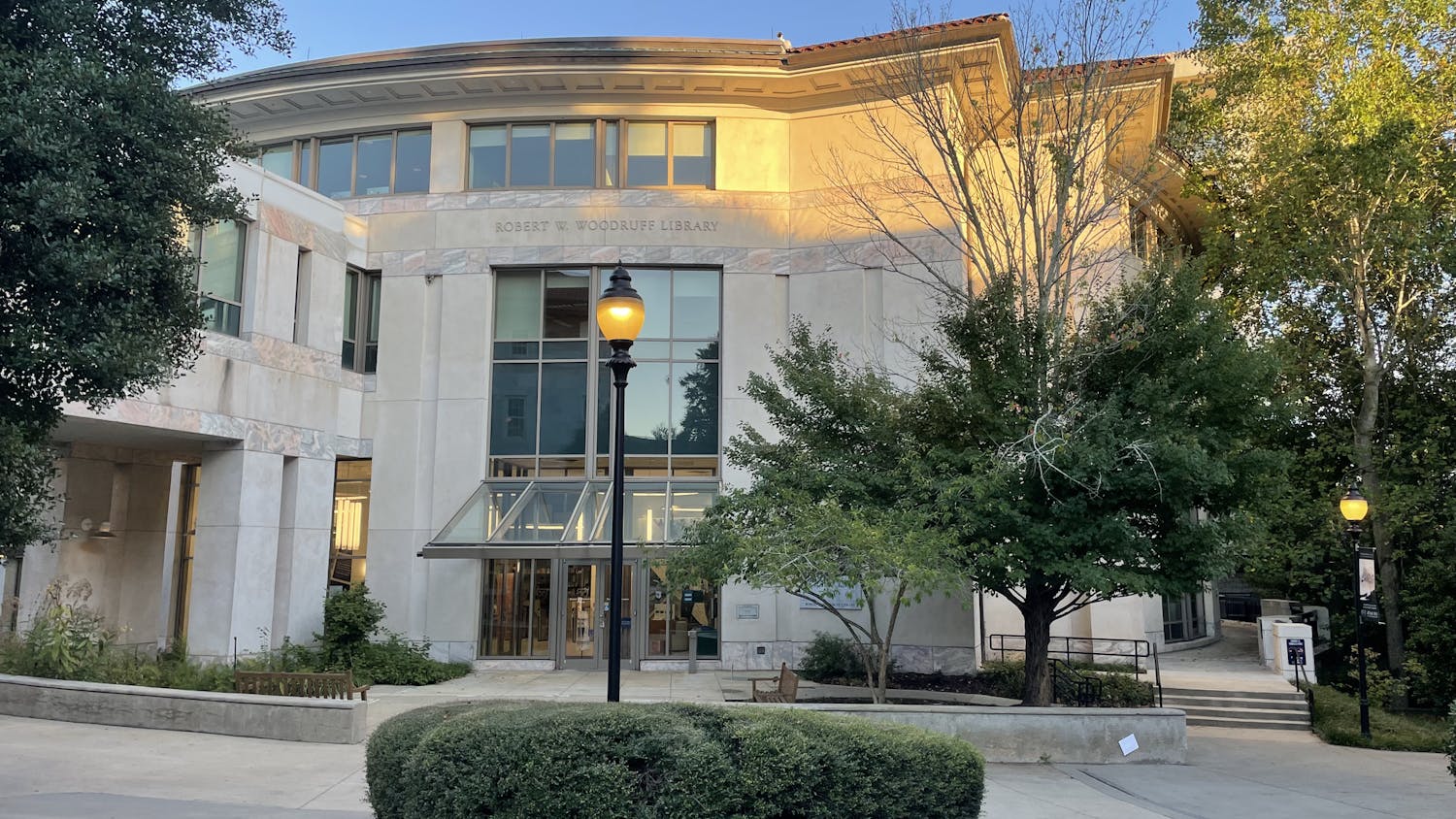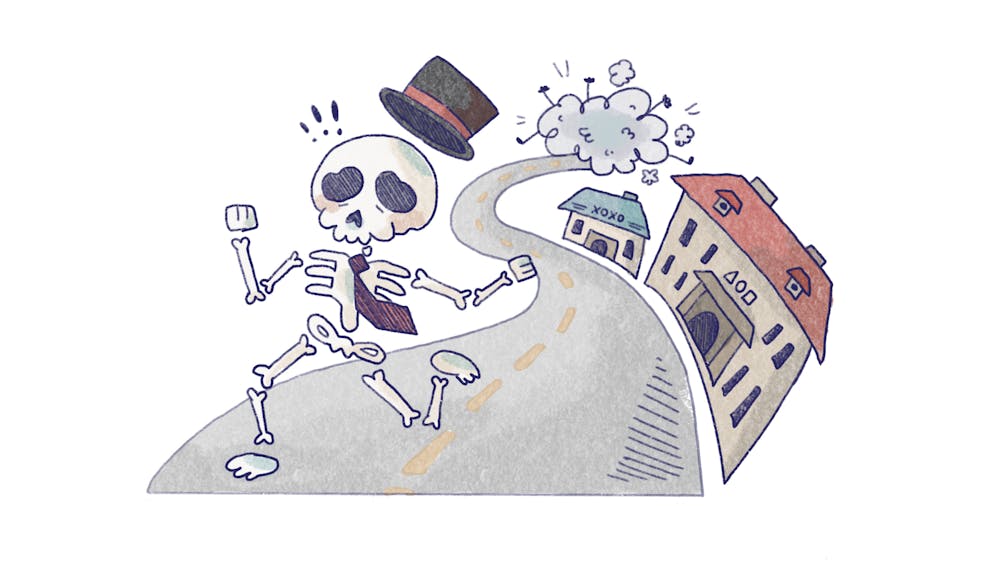Content warning: This article contains references to suicide and mental health crises
If you are having thoughts of suicide at Emory University, call Student Intervention Services 24/7 at 404-430-1120. Emory’s Counseling and Psychological services can be foundhere. To reach The Emory Helpline, call 404.727.4357 from 8:30 p.m. to 1 a.m. all days of the week when Emory is in session.If you are outside of Emory, call the Suicide and Crisis Lifeline at 988 and access more informationhere. The GA Crisis and Access Line can be foundhere or at 1-800-715-4225.

The people on the phone will never know each other’s names. Once one of them hangs up, the conversation will go unrepeated, though it may have touched both callers deeply. In some cases, that conversation might save a life. But what’s said on the phone stays on the phone. Stranger to stranger.
On a banner off of Asbury circle or on posters in the narrow recesses of White Hall’s gloomy bathrooms, students may find an advertisement for the Emory Helpline. The message is simple: call this number if you need support. The Helpline, a confidential, peer support telephone line for students with non-urgent mental health needs, operates nightly from 8:30 p.m. to 1 a.m. when students are on campus. With the motto “For students, by students” 一 all volunteers and executive board members involved with the Helpline are students. With the exception of the outreach chair, who facilitates recruitment and publicity events, all volunteers remain completely anonymous.
The Helpline began in 1979 at a time when there was no counseling center on campus. With just 10 volunteers and $200, graduate students and professors in the psychology department, as well as the Dean of Students, founded the telephone line to provide mental health support to students. Since then, the line has grown to become an integral part of Emory, responding to over 100 calls a year on average. Outside of taking calls, the organization also works to advocate for mental health concerns on campus..
National crisis lines, including the recent launch of the 988 Suicide and Crisis Lifeline, have increased access to mental health help and resources for people around the country. But the Emory Helpline is unique in its purpose to specifically serve the Emory community.
“One reason to go with talking to somebody on the Emory helpline as opposed to a national line is because we really understand the environment … so we can also tailor our resources that we offer to that person,” Adina Peck (23C), current outreach chair for the Helpline, said.
Besides the ability to provide Emory specific resources and support, the Helpline also provides peer support 一 a connection between students at a similar stage of life, with Emory as a common denominator. Unlike a national line, the Emory line is not reserved for severe crises. Students can call if they need someone to vent to, get advice from or just listen.
Training to take a call for the Helpline is rigorous. In fact, the application and training process take close to a year for potential volunteers to complete before they take their first call. Applications usually open in October with an interview later in the semester. After that, they undergo training throughout the spring semester.
“Our baseline training involves both didactic and experiential components,” Dr. Irene Daboin Dominguez, the Helpline advisor said. “These cover a wide variety of topics including - but not limited to –– helping and active listening skills, crisis intervention, suicide prevention, cultural humility, gender and sexual diversity, substance use concerns, eating disorders and intimate partner violence.”
Active members also receive continuing education, supervision and support from Daboin Dominguez throughout their time at the Helpline.
When a call comes in, the caller speaks directly with a volunteer, who greets them and invites them to share about whatever is on their mind. Rather than giving advice or telling people what to do, the Helpline believes in helping callers understand themselves, know when they need help and learn how to address their situations. It was this mission that drew Peck to join the Helpline.
“It's more about helping people come to whatever solution is best for their life at that moment and helping people to help themselves was really something that stuck out to me as a group I would want to be part of,” she said. The call is confidential except when callers are at immediate risk of hurting themselves or others, or if there is a minor, dependent adult or elderly person in harm’s way.
For the students working with the Helpline, responding to calls is an investment in the Emory community. Volunteers work shifts until 1 a.m. in the morning. They work on weekends. They are never recognized or even known around campus. It’s not a job that can go on a resume until post-graduation or something they can ever talk about with friends. But it is far from a thankless task.
“It was hands down the best club organization on campus that I could have gotten involved with,” Hailey Greenstone (22C), an alumni of the Helpline and current first year medical student at Tufts University (Ma.) said.
She has seen the skills she learned while volunteering extend past her time at Emory. In a med school course that discussed trauma-informed care and empathizing with patients, Greenstone found that investing in other people came naturally to her after working at the Helpline. Volunteering with the telephone line at Emory consistently reminded her why she wanted to be a doctor, and she knows the experience will make her a better physician.
“I could do something powerful there and now I get to continue that legacy in a different setting,” Greenstone said.
The most challenging calls for Greenstone were the ones that hit close to home. “You want to still stay mentally separate from their experience and you want to recognize this as a different person living a different life,” she said. But those same conversations were also the ones that left her the most grateful, knowing she had given them the best support she could.
“Even if I felt like I had been exhausted emotionally from my own day, when I would take a shift, I knew I could handle whatever came up,” she said. “I knew I could do something for other people in a way that maybe I couldn't even do for myself.”
Every conversation is unpredictable — a reality that the students who work for the Helpline face every time they take a call.
“You can never be fully in control of a conversation,” Peck said. “That's just how conversation works, right? The other person is on the line. You don't know what they'll say. You don't know how they'll react. You can only just do your best.”
Once a caller hangs up, volunteers on the other end of the line don’t know what happens to them. All they can do is trust that they provided the support that students needed to the best of their ability. One source of comfort and solidarity that Peck and Greenstone found was in the community of students like them that volunteer for the Helpline. Together, the volunteers create a culture of never feeling alone in the work they do. Even though they don’t directly process emotional conversations with one another, there’s a mutual understanding that makes each volunteer a part of a network much bigger than themselves.
“When hard things happen on campus, we all really take it personally whether or not we know the people who are experiencing hard things on campus,” Greenstone said.
The Helpline prepares extra hard when difficult events happen on campus in order to effectively handle calls about them.
“We exist for the benefit of the Emory community, not for ourselves or for the benefit of our members,” Daboin Dominguez said. “It is our honor and privilege to destigmatize mental health concerns and cultivate a more accepting community through the work that we do.”
Greenstone said she will always be grateful to have been a part of the Helpline and that it has made her a better person.
“I'm so grateful to the fact that CAPS allows the helpline to exist because it was something that I was able to lean on,” Greenstone said. “When everything else in my life I felt like I couldn't control, I felt like I could make a difference in someone else's life.”
The people who call the Helpline will never know who they are talking to. They will never be able to thank them for the support they offer. The call will remain an exchange of strangers. An act of kindness.
“The Helpline is so special because it's a choice that people are making to give up part of their time and a lot of their emotional energy to care for people that they don't even know,” Greenstone said. “That’s just such a beautiful gift to give.”
Update (2/1/23 at 3:54 p.m.): A previous version of this article stated GA Crisis and Access Line as (800)-273-TALK. It is, in fact, 1-800-715-4225.








